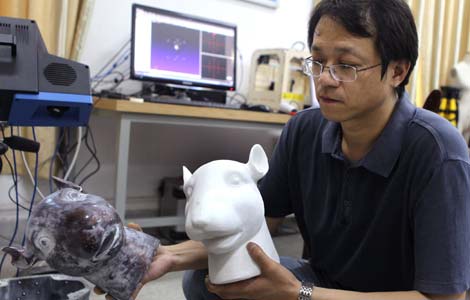IPO reforms draw skepticism in some quarters
Updated: 2013-07-24 07:20
By Yang Ziman (China Daily)
|
|||||||||||
To guarantee fair pricing, the CSRC reform states that individual investors should be included in the price-setting process.
At least 20 individual or institutional investors are required for issues of less than 400 million shares. At least 50 such investors are required for larger issues.
Xiong Jinqiu, a financial expert, said the reform proposals place too much emphasis on prevention rather than punishment.
Overpriced new issues will only be temporarily suspended, at best. For instance, when new share prices rose last year, the CSRC concluded after a brief investigation that prices were being pushed up by many individual shareholders.
It did not occur to the commission, Xiong said, that the individuals might be acting collectively on behalf of a "price-rigging mastermind".
Since IPO reform no longer produces significant results, said Xiong, the CSRC should instead take tough steps to crack down on secondary market price manipulation to end fraudulent behavior.
The draft reforms also said that applicants waiting for IPO approval could issue bonds in the meantime to diversify their financing sources. Once approval is obtained, companies can choose the timing of the issue on their own.
Abolishing 'redline'
Further, the proposed reforms abolish the "25 percent" redline. According to IPO policies that prevailed last year, if the price-earnings ratio of the IPO is 25 percent higher than for comparable companies, the issuer must call a board meeting and submit an explanation to the CSRC. In that situation, the commission could order the issuer to reset the IPO price. Now, issuers would only have to release an explanation for the above-average prices and warn investors of potential risks.
Some analysts see the entire reform package as nothing more than tinkering with technical problems. Hua Sheng, a veteran economist and president of the Beijing Yanjing Overseas Chinese University, said that the proposal does not touch the most important issue - approval rights. The decision on conducting an IPO remains in the hands of the CSRC, rather than the market.
Lin Yixiang, chair of Beijing-based TX Investment Consulting, agreed with Hua's opinion that the reform sidesteps the question of "who decides who can go public". If the approval process remains the same, it is hard to make any breakthroughs.
Hua and Lin suggest the regulatory should loosen its control and leave it to the issuers and buyers themselves to decide when to go public, at whatever price, and whether or not the stocks are worth buying.
Xiong, however, is against the idea of loosening administrative power prematurely. The mainland stock market is still in its infancy, he said, and without CSRC oversight, issuers wouldn't wait to go public at any time, regardless of market conditions. This is because once listed, issuers have many prerogatives.
When companies see the stock market as an ideal place to rip off ignorant investors, lack of government involvement will do more harm than good.
Apart from increasing the accountability of issuers and underwriters, Ke Jingmin, a financial commentator, said the regulator itself should assume more responsibility.
Based on the principle of "with power comes responsibility", the CSRC must be accountable for giving the green light to IPO applicants who are later involved in fraudulent conduct.
The current system misleads investors into believing that companies that passed the CSRC's approval process are trustworthy, Ke said.
However, scandals such as those involving Green-land Biological Technology and Wanfu Biotechnology demonstrate that the CSRC's endorsement can't necessarily be relied on. The agency needs to be responsible for any approval it is going to grant, Ke added.
Related Stories
Chinese shares jump over IPO delay reports 2013-07-23 15:37
Smithfield's China bidders plan HK IPO after deal 2013-07-17 11:32
China shares close lower over massive IPO fears 2013-07-08 15:52
PwC: HK IPOs expected to boom this year 2013-07-03 01:55
IPO door re-opens 2013-07-02 11:02
IPOs likely to resume in H2 2013-06-28 02:59
Today's Top News
Minors going online to buy smokes
Forbidden City bans lighters, matches
Israelis, Palestinians kick off peace talks
Manning 'sorry' for US secrets breach
Snowden case not to affect US-Russia talks
Over 200 dead after Egypt forces crush protesters
Slowing economy takes toll
UN seek private firms' help in curbing HIV/AIDS
Hot Topics
Lunar probe , China growth forecasts, Emission rules get tougher, China seen through 'colored lens', International board,
Editor's Picks

|

|

|

|

|

|





